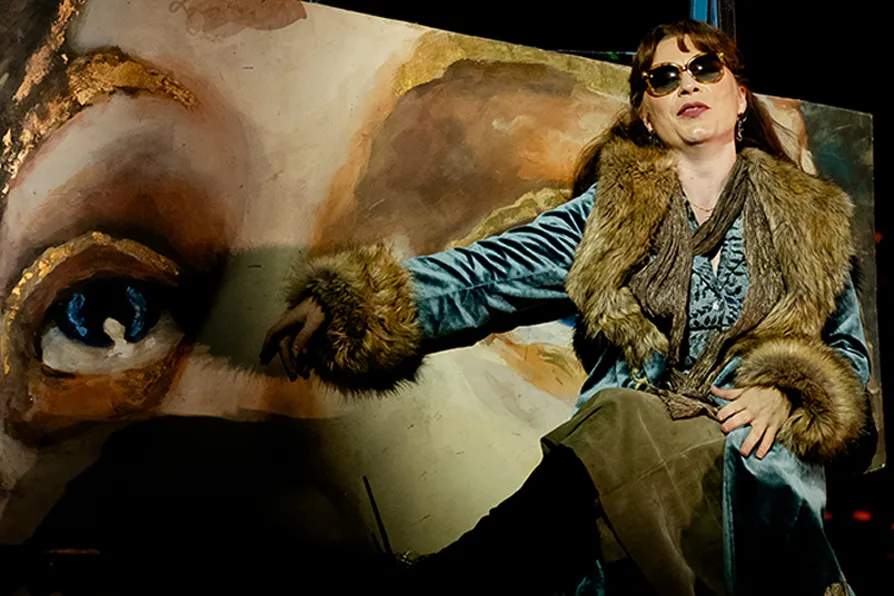The Bard stands with the Reformers of Peterloo, and their shared genius in teaching history with music and song
DAVID NICHOLSON is thrilled – and shocked – by an opera that seethes and sizzles with passion and the depraved use of power

 SIZZLING: Natalya Romaniw as Tosca [Pic: Dafydd Owen]
SIZZLING: Natalya Romaniw as Tosca [Pic: Dafydd Owen]
Tosca
Wales Millennium Centre, Cardiff
★★★★★
OPERA returned to the main stage at Cardiff’s Millennium Centre with a triumphant version by Welsh National Opera of Puccini’s perennial favourite, Tosca. Director Edward Dick has brought us Opera North’s version of the three-act opera which seethes and sizzles with passion and the depraved use of power.
Natalya Romaniw is sensational as Floria Tosca, and absolutely lives and breathes the role of the eponymous leading soprano of Rome.
Tosca visits the cathedral to pray, but also to arrange an assignation with her lover — the painter Mario Cavaradossi, sung here by Andres Presno. The two spar as she examines his latest work for the cathedral where he has used the image of a woman visiting the church as the Madonna, and Tosca recognises her.
Flying into a jealous rage, Tosca accuses the painter of betraying her love with somebody else. Her suspicions were already aroused when she entered the church as she heard voices — the escaped political prisoner Cesare Angelotti and Cavaradossi — and instantly thought her lover was hiding another woman.
The two are beautiful together as they sing of their love, but after making up Tosca coquettishly reminds her lover to repaint the woman’s eyes brown to match her own.
The escaped prisoner is helped by Cavaradossi to leave the church and hide in the painter’s villa. And hot on Angelotti’s heels is baritone Dario Solari’s Baron Scarpia, a decadent aristocrat who wields power as the head of the secret police in Rome, and abuses his position to force himself on unwilling women. Scarpia’s aria at the end of Act One, as he considers how he can force himself on the opera star Tosca, is a triumph of acting and singing as he lasciviously plots to force her to submit to him.
The church choir are singing a prayer, while Scarpia simultaneously sings of his plans to murder Cavaradossi who he has arrested on suspicion of aiding an escaping prisoner, and bedding Tosca. The church bells ringing during the opera were purposely made for the WNO and add to the overall feel of a real-life drama unfolding before us.
Scarpia’s dastardly plan unfolds in Act Two where he tells Tosca she has to save her lover’s life by submitting to him. Overcome with the terrible dilemma, Tosca sings one of Puccini’s most famous arias for a soprano, Vissi d’arte — I Lived for Art. In the aria, Tosca sings that she has lived for art and for love and asks why God has forsaken her in her darkest hour, given her piety and devotion.
The opera’s tragic ending is well known, but is still a shock and is beautifully acted by Romaniw and Presno.
Tosca is an old favourite that opera companies wheel out to fill seats, and there is nothing wrong with that in the cash-strapped times WNO finds itself in, after its funding has been cut.
But the power of art, music and theatre to move our emotions and connect with what is happening on stage is a powerful experience and WNO has to be applauded for a stunning revival of a wonderful Opera North production.
On tour until October 18. For more information and tickets see: wno.uk.

JULIA TOPPIN recommends Patti Smith’s eloquent memoir that wrestles with the beauty and sorrow of a lifetime

GORDON PARSONS is blown away by a superb production of Rostand’s comedy of verbal panache and swordmanship

DAVID NICHOLSON recommends a dazzling production of Bernstein’s opera set in a world where chaos and violence are greeted by equanimity











